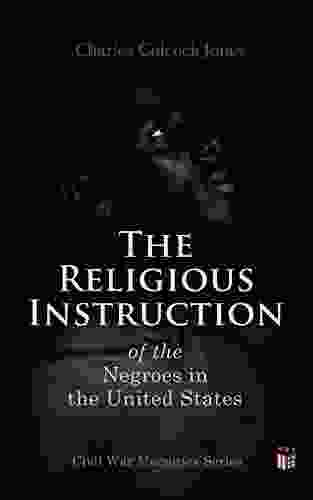The Religious Instruction of the Negroes in the United States

The history of religious instruction for African Americans in the United States is a complex and multifaceted one. From the earliest days of slavery, Africans brought their own religious beliefs and practices to the New World. However, these beliefs and practices were often suppressed or distorted by the dominant white culture. As a result, African Americans developed their own unique religious traditions, which blended elements of African and American culture.
4.6 out of 5
| Language | : | English |
| File size | : | 1618 KB |
| Text-to-Speech | : | Enabled |
| Screen Reader | : | Supported |
| Enhanced typesetting | : | Enabled |
| X-Ray | : | Enabled |
| Word Wise | : | Enabled |
| Print length | : | 144 pages |
In the 19th century, a number of white abolitionists and missionaries began to work to provide religious instruction to African Americans. These individuals saw religious instruction as a way to uplift the slaves and prepare them for freedom. However, their efforts were often met with resistance from slave owners, who feared that education would make their slaves less obedient.
After the Civil War, the Freedmen's Bureau established schools for African Americans throughout the South. These schools provided not only academic instruction but also religious instruction. This instruction was often based on the Protestant denominations that were dominant in the United States at the time. However, African Americans also began to develop their own independent churches, which often reflected their unique cultural and religious experiences.
In the 20th century, religious instruction for African Americans continued to evolve. The rise of urban centers led to the growth of new denominations, such as the Pentecostal and Holiness churches. These churches emphasized emotionalism and personal experience, and they appealed to many African Americans who were seeking a more passionate and fulfilling religious experience.
The Role of Slavery
Slavery had a profound impact on the religious development of African Americans. Slave owners often forbade their slaves from practicing their own religions, and they forced them to attend Christian services. However, slaves often found ways to incorporate traditional African beliefs and practices into their Christianity. As a result, a unique African-American Christianity emerged, which blended elements of both cultures.
One of the most important aspects of African-American Christianity was the emphasis on music. Music was a way for slaves to express their emotions and to connect with their ancestors. Spirituals, which were songs that often expressed the slaves' longing for freedom, were a particularly important part of African-American religious life.
The Role of Education
Education played a vital role in the religious development of African Americans. In the 19th century, a number of white abolitionists and missionaries began to work to provide religious instruction to slaves. This instruction was often based on the Protestant denominations that were dominant in the United States at the time. However, African Americans also began to develop their own independent churches, which often reflected their unique cultural and religious experiences.
In the 20th century, the rise of urban centers led to the growth of new denominations, such as the Pentecostal and Holiness churches. These churches emphasized emotionalism and personal experience, and they appealed to many African Americans who were seeking a more passionate and fulfilling religious experience.
The Role of the Church
The church has played a central role in the religious life of African Americans. In the early days of slavery, the church was often the only place where slaves could gather and socialize. The church also provided slaves with a sense of community and support.
After the Civil War, the church continued to play an important role in the lives of African Americans. The church was a place where African Americans could worship freely, and it was also a place where they could learn about their history and culture. The church also played a key role in the civil rights movement, providing a platform for African Americans to speak out against injustice.
The religious instruction of the Negroes in the United States has a long and complex history. From the earliest days of slavery to the present day, African Americans have sought to find expression for their religious beliefs and practices. The result has been a rich and diverse religious tradition that has shaped the culture of the United States.
4.6 out of 5
| Language | : | English |
| File size | : | 1618 KB |
| Text-to-Speech | : | Enabled |
| Screen Reader | : | Supported |
| Enhanced typesetting | : | Enabled |
| X-Ray | : | Enabled |
| Word Wise | : | Enabled |
| Print length | : | 144 pages |
Do you want to contribute by writing guest posts on this blog?
Please contact us and send us a resume of previous articles that you have written.
 Book
Book Novel
Novel Chapter
Chapter Genre
Genre E-book
E-book Newspaper
Newspaper Paragraph
Paragraph Bookmark
Bookmark Shelf
Shelf Bibliography
Bibliography Foreword
Foreword Preface
Preface Footnote
Footnote Codex
Codex Bestseller
Bestseller Classics
Classics Library card
Library card Biography
Biography Autobiography
Autobiography Reference
Reference Dictionary
Dictionary Narrator
Narrator Character
Character Resolution
Resolution Librarian
Librarian Catalog
Catalog Card Catalog
Card Catalog Stacks
Stacks Archives
Archives Periodicals
Periodicals Research
Research Lending
Lending Journals
Journals Rare Books
Rare Books Study Group
Study Group Storytelling
Storytelling Awards
Awards Reading List
Reading List Book Club
Book Club Theory
Theory Naomi Joy
Naomi Joy Penelope Lively
Penelope Lively Peter Coleman
Peter Coleman Michael Richard Craig
Michael Richard Craig Jeremy Allen
Jeremy Allen Hilary Moore
Hilary Moore Elizabeth Fitzelle Nuti
Elizabeth Fitzelle Nuti Paul Paquette
Paul Paquette Fern L Johnson
Fern L Johnson Debbie Howells
Debbie Howells Darby Rollins
Darby Rollins Ellen Hopkins
Ellen Hopkins Gerard Noel
Gerard Noel Muriel Barbery
Muriel Barbery Richard B Gartner
Richard B Gartner Robert H Bork
Robert H Bork Tamara Ferguson
Tamara Ferguson Rita Katz
Rita Katz Jonathan Pearlman
Jonathan Pearlman Nedu Kels
Nedu Kels
Light bulbAdvertise smarter! Our strategic ad space ensures maximum exposure. Reserve your spot today!
 Yasushi InoueFollow ·18.3k
Yasushi InoueFollow ·18.3k Austin FordFollow ·9.2k
Austin FordFollow ·9.2k Haruki MurakamiFollow ·9.9k
Haruki MurakamiFollow ·9.9k Dean CoxFollow ·3.4k
Dean CoxFollow ·3.4k Jesse BellFollow ·19.3k
Jesse BellFollow ·19.3k Cameron ReedFollow ·10.1k
Cameron ReedFollow ·10.1k José MartíFollow ·11.7k
José MartíFollow ·11.7k Kevin TurnerFollow ·11.9k
Kevin TurnerFollow ·11.9k

 Bryce Foster
Bryce FosterPerforming Asian American Women On Screen And Scene
The representation of Asian American women...

 Frank Mitchell
Frank MitchellGirl Can Draw: A Spirited and Inspiring Play by Joe...
Prologue In the realm of...

 Marc Foster
Marc FosterThe Epic Story of Race and the American Media: A Journey...
From the Shadows of Slavery to the Dawn of...

 Demetrius Carter
Demetrius CarterThe Ultimate Guide to Hiking West Virginia: Discover the...
West Virginia, often referred to as...

 Isaiah Price
Isaiah PriceThe Ten Step Guide on How to Become Famous: Unleash Your...
In the captivating world of entertainment...
4.6 out of 5
| Language | : | English |
| File size | : | 1618 KB |
| Text-to-Speech | : | Enabled |
| Screen Reader | : | Supported |
| Enhanced typesetting | : | Enabled |
| X-Ray | : | Enabled |
| Word Wise | : | Enabled |
| Print length | : | 144 pages |












